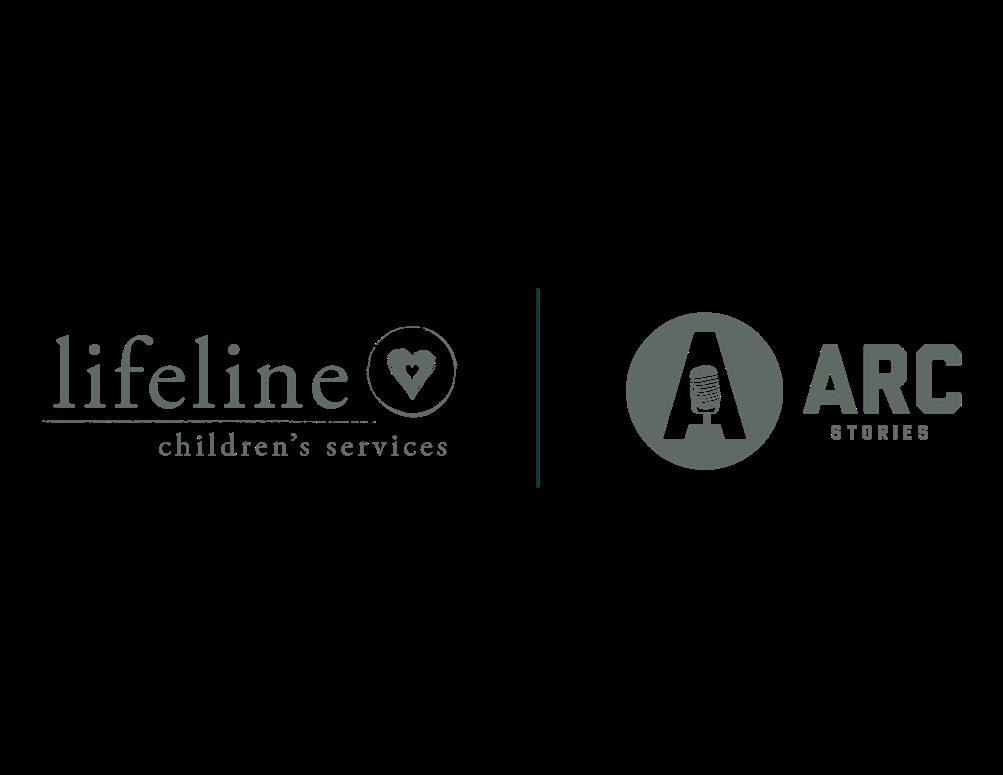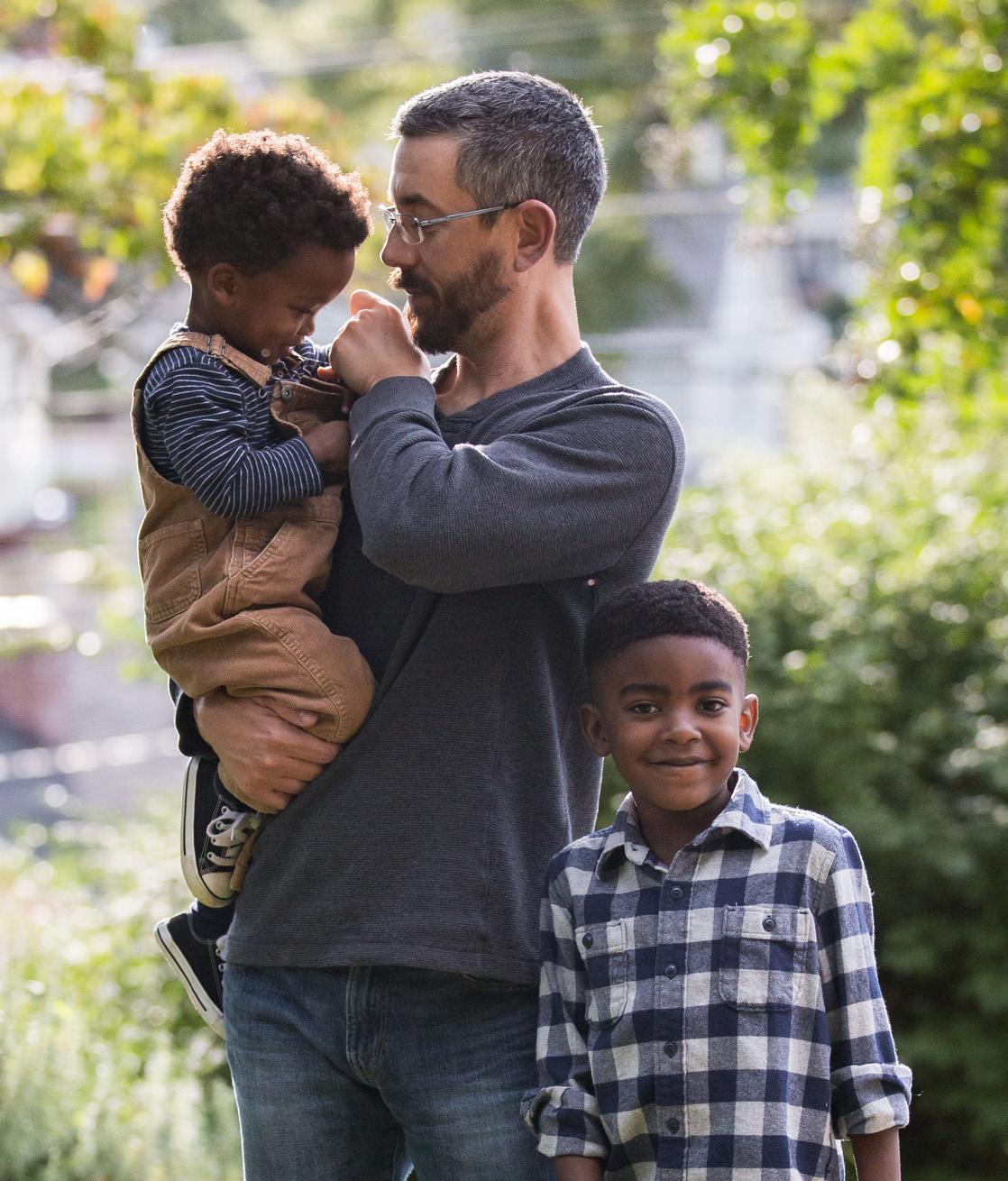
13 minute read
BIRTH FAMILY, FOSTER FAMILY, FOREVER FAMILY
BIRTH FOSTER FOREVER FAMILY
OPENING THE DOORS OF CONVERSATION
Advertisement
The general culture of talking about a child’s adoption has shifted over the past few decades. Being open with a child about his or her adoption is now much more commonplace. However, for parents, talking about birth parents can often cause feelings of fear, insecurity, or inadequacy. As shepherds of their children’s hearts, though, parents must recognize that a child’s understanding of his identity and self-worth is connected to his family of origin. By talking openly, parents give children the freedom to safely explore the emotions and thoughts that are so closely tied to their story. Giving children permission to love all families from their story strengthens relationships and provides a solid foundation for understanding their past, not being ashamed of who they are, and navigating life in a healthy way. Talking with children in the foster care system about their families may also be uncomfortable for foster parents, particularly when circumstances are challenging. Nevertheless, having an age-appropriate and truthful understanding of their birth family and past will help children move toward their future with confidence and hope. In light of the importance of this topic and practice, Traci Newell, a personal and professional expert in adoption education and family reconciliation at Lifeline, shares helpful insights and guidelines about talking with your children about their birth parents.
HOW DO YOU INTRODUCE YOUR CHILD(REN) TO THE IDEA OF BIRTH PARENTS?
The phrase “birth parent” should be introduced to children who were adopted into their families or placed into foster care from an early age. You can acquaint your child with the concept of “birth family” from the beginning by openly talking about different kinds of families: birth families, forever families, and foster families. Books with colorful illustrations and simple language can be very effective tools. If this is a topic that you have not covered with your child, and he is now older, it is never too late to start. If your child is curious but not asking questions, it could be that he is fearful of hurting your feelings. You can take opportunities, such as birthdays and other special occasions (Mother’s Day, Christmas, etc.) to start the dialogue. For example, you might say something like, “Today is such a special day. I wonder if it makes you think about your birth mom or birth dad because I have been thinking about them.” It is important that you follow their cues, though, and don’t push if you encounter resistance. If your child is older and was placed into your home through foster care, it is important to acknowledge his birth parent(s) as his parents and call them by the name(s) your child has assigned to them.
HOW DO YOU ANSWER QUESTIONS IF YOU DON’T KNOW THE ANSWER?
(In Adoption) Be honest. By responding, “I am not sure, but I will try to find out” you communicate that you are not withholding information and that it’s an important question to you. If the question is tied to something nonspecific about your child, like the place where he was born, you may even involve them in your investigation. If you believe the question could lead to the discovery of difficult information, assure your child that you are committed to find out what you can. Discerning when your child is ready to receive certain parts of their story can be tricky, but usually if they are asking, they are ready. For some children, there are lingering questions about their birth. If you were not present for your child’s birth and you do not have records from the hospital, then you may not be able to gather specific information. If not, it is ok to speculate as long as you do not make up details of the birth. For example, you may say: “Many babies are born in a place called a hospital.” “You probably cried a lot because the world was brand new to you.” “I bet you were a beautiful baby.” “I sure do wish I could have been there to see you.” Acknowledging your sadness that you missed parts of your child’s life is ok. Grief can feel isolating if it is not shared. Make sure that your grief does not overshadow theirs and that the discussion stays child-focused. (In Foster Care) Because shared parenting is an important part of foster care, it is important that the adults in your child’s care are telling him the same story. When possible, collaborate with your child’s birth parent(s) and social worker to determine what he already knows and what the birth parent(s) would like him to know. Relying on the social worker to collect as much information as possible is important, and you may need to ask questions of the child, too. If your child was in a previous placement, you may need to gather information from his former foster family, and if your child does not have a life book (with pictures and information about important milestones), it is not too late to create one.
Compiled by Jenny Riddle with Traci Newell, LBSW, TBRI® Practitioner, Education Specialist, & National Program Director for Families Count™
OPENING THE DOORS OF CONVERSATION
HOW DO YOU ANSWER QUESTIONS WHEN THE ANSWERS ARE HARD TO HEAR?
Some parents are inclined to shield their child from hard parts of their story. This type of “protection” can actually perpetuate feelings of shame, however, and can inadvertently lead your child to make assumptions that are untrue. Normalizing adoption and foster care for your child means talking about even the most difficult subjects — if they sense you are comfortable, more than likely, they will be too. For younger children, more concrete explanations are needed, but as children progress in development they are able to conceptualize and move into more abstract thinking. This is the time when they will need more specific information so they don’t draw their own conclusions.
After sharing difficult information, your child may need to be held or may need to be alone for a while. It is good to follow-up with the question, “How are you feeling?” after your child has absorbed the information. Acknowledging that it is ok for your child to have feelings about hard information is important.
WHAT DOES IT MEAN TO YOUR CHILD WHEN YOU ARE RESPECTFUL OF THEIR BIRTH PARENTS?
Your child’s sense of identity, especially as he comes to understand how the family is structured, will more than likely be tied to your family and to his birth family. This happens naturally because there is a God-given connection to one’s family of birth. The way that you talk about your child’s birth parent(s) may have a direct bearing on the way he views himself. Showing respect to and for your child’s birth parent(s) in the way that you interact with them or talk about them may not be something that comes easily, particularly if you have witnessed the negative results of a parent’s wrong choices. The message that this type of positive communication sends to your child, though, is one that can bear heathy fruit in your relationship for years to come. More importantly, if your desire is for your child to understand his value as an image bearer of Christ, he needs to understand from what you say and do that his birth parent(s), too, are His image bearers.
HOW DO YOU NURTURE AN ENVIRONMENT WHERE YOUR CHILD FEELS COMFORTABLE TO TALK ABOUT BIRTH PARENTS?
One of the main reasons parents cite for not talking with their children about birth family is the fear of saying the wrong thing. The good news is, what you say is usually not as important as how you listen. Actively listening to your child — even when you have strong feelings and opinions about the topic — means setting aside distractions and saving your responses until the child has finished talking. Before responding, it is also good to ask clarifying questions like “What did you mean when you said … ?” Many children want to be careful to not hurt their parents’ feelings, but in order for children to grow and develop in healthy ways, they need your permission to think and talk about their birth families with the people they trust most — you. You grant this permission when you are approachable and “safe.” Some experts recommend these talks take place from the beginning — even from infancy. The goal should be to create safety for your child to come to you and ask questions at any stage of their development.
HOW CAN WE, AS PARENTS, NOT FEEL AFRAID? OR, WHAT SHOULD WE FEEL?
There are no predictors of how you will feel in response to your child’s questions and thoughts about their birth family. Regardless of your background, it is important to recognize the normalcy of your feelings — whether positive or negative — and to deal with any negative feelings in a healthy way. A first step in “dealing” with your feelings is talking honestly to a trusted confidante (or sometimes, a neutral third-party) about how you are feeling. Many parents through foster care or adoption will avoid talking about their true feelings because of shame or a fear of being judged. In this case, it can be a good thing to find another mom or dad with whom you have adoption/foster care in common to confide in. Feelings are not wrong; it is what you do with those feelings that matters most. By avoiding honest conversations, you may be prolonging or exacerbating negative feelings, which can hinder open communication with your child. Above all, if you have placed your faith in Jesus Christ, you, too, are adopted. Because you have a Father with “unsearchable understanding” (Isa. 40:28), you can confidently go to Him with your thoughts and feelings and He will not reject you or turn you away. If you have questions or concerns about talking to your children about their birth families, reach out to your social worker or Lifeline’s Education & Counseling team. For further reading, including sample ways to explain sensitive issues with birth families, see Chapter 11 of The Whole Life Adoption Book by Jayne E. Schooler & Thomas C. Atwood.
UPCOMING EVENTS
SANCTITY OF HUMAN LIFE January 17, 2021
ROOTED IN LOVE January 24, 2021
CHINESE NEW YEAR February 12, 2021
BIRMINGHAM,AL Arc Stories — April 29, 2021
SOUTH CAROLINA Bingo Night to benefit Lifeline’s Foster Care program — May 2021 Join “Team Fostering Hope” in the Palmetto 200 — March 27-28, 2021
KANSAS Fundraising Dinner in Topeka — March 26, 2021

Celebrating Retirement
“How beautiful upon the mountains are the feet of him who brings good news, who publishes peace, who brings good news of happiness, who publishes salvation, who says to Zion, ‘Your God reigns.’” Isaiah 52:7
Renee Griffin served families, children, and foster families with excellence over a 38-year tenure. During that time, she and her husband, Dan, saw their family grow with four children and 10 grandchildren, and she had a hand in helping more than 1,500 families grow through adoption. Always a servant of Christ, ready to listen and respond in love, she is a sister who laughs and cries with families in their joy and pain and a servant who does whatever she is called to do. Lifeline will never be the same without Renee Griffin serving domestic adoptive families, but Lifeline is so much better because of her years of service.

Thank you, Renee! We love you.
Thank You to Our Partners
May 2020- September 2020
Douglas Acton Maryssa Allen Ron Anders Alice Arceneaux Mark Armstrong Michael S. Bailey Randy Barth Stephen Battise Richard Baxter Aaron Bean Jeffrey Beard Brian Beckett Alicia Den Beste Jeremy and Amy Bettis Tracy Bird Barbara and Chris Blackerby Stephen C. Blake Phillip Blume M. Steven Bobo Stephen Brandt Jody Brannon Corey Braun Steve Brock Philip Brown Martin Browne John Burnam Lindsey Ann and Benjamin Burnett Heather and Ryan Cain James Caldwell Josh Caldwell Luke Caldwell Marie Calhoun Steven Campora Ling Cao Sara Carey Matthew Carrington William and Diane Carroll Michael Catania Beth Chang Hugh Cheek Kelly Cheeseman Kim Christenberry Nita Christopher Cameron Clayton Nathan Click Jordan Coggin Chris Coghlan Douglas Cole Heith Comer Kandace Cornutt Tim Crist Alice Crook Mike Cuenin Blake Cullen Merritt Cullum David Dantzscher Hannah Jane Dantzscher Emily Ann Dean Dick Deshazo John P. Dobbins Johnston Draviam Damayanthi Durairaj Kim Dykes Franklin Eaton Robert Echols Jr. Patrick Elfelt Lucas and Meagan Ellerman Mary Ellison Theresa Enfinger Susanna Epling Ryan Hunter Evans Thomas Finley Timothy Fisher Mayo Flynt Dylan and Amy Friend Sally and Gerald Friesen Melanie Fuller Walker Gann Jay Gemes Brittney Gilbert Ellison Glenn Carl Douglas Glidewell Jerry Green Greg Grell Amy and Jonathan Griffith Kevin Gwyn Justin Hall Brenda and Brian Hankins Kylee Earl Harrelson Steven and Holly Beth Harris James Helton Joel Herring Kelly Hii Stacey and Stephanie Holt Sarah Hughes Terra Hussar Ashley Hutchings Daniel Jackson Wesley James Vinod and Punita Jeyakaran Belinda and Adrian Johnson Emilee Johnson Stephanie Jones Alese and Walter Robert Jones Henry and Sharon Jones Jessanth Joseph Justin Kaldenbach Amanda King Patricia M. King Katie Jo Kinney Kristen Kish Gabriel Kovatch Jeremiah and Samantha Krienke Tom Lambert Shanti Landon Chassidi Likens John Lindley Elise Logan Dina Long Miranda Lovell Jonathan Lowe Stephanie Lynn Brian Magner Eric Mann Lauren Marsh Robert and Casey Martin Ann and Charles Martin Carol Matheny Mel Mathisen David Maxwell James McKay Peggy McKey Joseph and Stacey McSweeney Christopher Steve Miller Connie Minish Arnold Mooney Brianne and Allison Morse Aaron Patrick Mowery Susan Murray Heather Myers Eric and Melissa Nelson Herbie M. Newell Scott Newton Bradley Nordquist Gary Oglesby Helen Orosz Marie Osborn Barry Parker Cayce Parker Doug Patton Philip Paul David Peck Nick Peyton John F. Phillips Beth Pickering Katie and Larry Pirkle Lori Pitner Randy Pittman David and Lee Ann Poland Barry M. Pomeroy Justin Posey Guy Posey Mikki Powell Eugene and Heather Preskitt Victor Raj Jeena Rajasekaran MariElena Raya Carolyn Reid Whitney Reidinger Heather Rhoades Troy Rhone Ramesh Richard Ryan Richardson Donald Richardson James and Betty Roberson Leanne Rogers Christopher and Allison Rogers Cleon Rogers Lorenzo Rojas Chris Rosson Stephen Sanders Paul and Laurie Sheffield Jerod and Allison Sinclair Bob Sinclair Mark Sly Linda Sly Christina Smith Catherine Spears Robert Spencer RIchard D. Spurlin Joshua and Rachel Steed Mike Stockard Amelia Echols Strauss Michael Stacy Thaggard Ryan and Hannah Grace Thorn Browning and Hannah Thornton Cristian and Hilda Toro Clinton Townsend David Turner Joshua and Katherine Ungerecht Padmarani Varadarajan Johanna Vest John and Jo Neel Vickery Volk Vinall Ashlee Wagner Ashley Walls James Wessel Michael Whitten James Williams Michelle Wingate Les Wright Carolyn S. Wylly Ross Younts David Zomeren
100 Missionary Ridge Birmingham, AL 35242
AS A MINISTRY, LIFELINE SEEKS
TO EQUIP THE BODY OF CHRIST TO MANIFEST THE GOSPEL TO VULNERABLE CHILDREN.
This work is only possible by God’s grace and through partners who care about the fatherless — like you — and give of their time, network, and resources.
Would you help Change One Life this year and participate in our Year End Campaign? Through a tax-deductible gift before December 31, 2020, you can make an impact in the life of a family in the process of adoption, help serve women in unexpected pregnancies, or facilitate trainings in places like Colombia so believers can learn how to best minister to orphans in their own community.

Or mark your calendars to join in on national Giving Tuesday (December 1) and your gift will be matched up to $2,500. Thanks to a generous donor, that means whatever you give on December 1 ($1, $20 or $1,000) will be doubled. Visit lifelinechild.org/donate or text Lifeline20 to 243-725 to make a donation of any amount.







